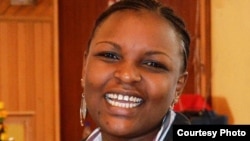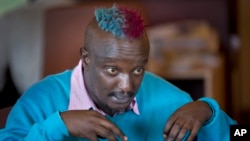As Kenyan lawmakers consider a law further outlawing homosexual behavior and gay activism, Jane Wothaya, a long-time advocate for the rights of gay, lesbian, bi-sexual and transgender (LGBT) in Nairobi, is continuing her fight from Washington, D.C.
Even as African governments outlaw homosexuality in Uganda, Nigeria and elsewhere, Wothaya has joined "not very out and open" activists who work for human rights in her homeland.
Wothaya was frustrated by the negative publicity and stigma that surrounds the LGBT minority in the Kenyan media. So she joined the Gay and Lesbian Coalition of Kenya to correct what she characterizes as wrong perceptions about Kenyans who fit that description.
Wothaya is a lesbian who advocates for LGBT rights. She was named an Atlas Corps fellow and now works with the Human Rights Campaign on gay community issues in Washington, D.C.
Raising public awareness about gender issues is different in Kenya, she told VOA News.
“I work with a group that is relatively not very out and open in Kenya,” said Wothaya, “because while Kenya is not exactly a very conservative country, it’s a very religious country.”
Clergy contribute to the prejudice against Kenyan LGBT community
Kenya’s understanding of sexual orientation and gender identity is minimal, Wothaya said.
There is a lot of prejudice based on the views of many of Kenya’s clergy and “there have been inciting statements made by politicians and a lot of misinformation and ignorance about issues related to sexual orientation and gender identity,” she said.
But it was social media and the mainstream press, radio and television that frustrated her the most.
“For example, we had radio stations that did call-in sessions where people would call and talk about the Gay and Lesbian Coalition of Kenya as though it is the devil or something," she said.
“And this was the kind of information that they were passing to their teenagers who were struggling to just get to know who they were and getting to discover what they were.”
Custom and tradition have perpetuated the problems for the gay community of Kenya. Wothaya described “the issue of living in a patriarchal society where gender role and gender norms are passed on for years and years, and so the prejudices and ignorance continue.”
Wothaya and her coalition colleagues engage the Kenyan community in public discussions on gender identity and sexual orientation. They raise sensitivity and awareness to help the general public to better understand and accept gay people.
The educational process is designed to get people to understand “that people don’t walk around with labels on their foreheads for you to see what their sexual orientation is. These people are your brothers, your sisters, your cousins, your employers and your employees.”
Wothaya discusses human rights violations with authorities
The Kenya coalition also documents and addresses violations that result from “Draconian laws" that target the LGBT community. They take their concerns to police, policy makers and others.
Wothaya said harsh treatment by the police – and others – is partially rooted in a punitive law inherited from British colonialists that calls for anyone “indulging in unnatural acts” or “acts against the order of nature" to be prosecuted.
Punishment for these acts is seven to 14 years in jail, but Kenyan lawmakers are mulling tougher penalties.
While the current Kenyan law is not as severe as the life sentence written into new legislation that President Yoweri Museveni of neighboring Uganda has signed, the Gay and Lesbian Coalition of Kenya is working to completely remove the lingering legacy of colonialism from Kenya’s legal system.
Even as African governments outlaw homosexuality in Uganda, Nigeria and elsewhere, Wothaya has joined "not very out and open" activists who work for human rights in her homeland.
Wothaya was frustrated by the negative publicity and stigma that surrounds the LGBT minority in the Kenyan media. So she joined the Gay and Lesbian Coalition of Kenya to correct what she characterizes as wrong perceptions about Kenyans who fit that description.
Wothaya is a lesbian who advocates for LGBT rights. She was named an Atlas Corps fellow and now works with the Human Rights Campaign on gay community issues in Washington, D.C.
Raising public awareness about gender issues is different in Kenya, she told VOA News.
“I work with a group that is relatively not very out and open in Kenya,” said Wothaya, “because while Kenya is not exactly a very conservative country, it’s a very religious country.”
Clergy contribute to the prejudice against Kenyan LGBT community
Kenya’s understanding of sexual orientation and gender identity is minimal, Wothaya said.
There is a lot of prejudice based on the views of many of Kenya’s clergy and “there have been inciting statements made by politicians and a lot of misinformation and ignorance about issues related to sexual orientation and gender identity,” she said.
But it was social media and the mainstream press, radio and television that frustrated her the most.
“For example, we had radio stations that did call-in sessions where people would call and talk about the Gay and Lesbian Coalition of Kenya as though it is the devil or something," she said.
“And this was the kind of information that they were passing to their teenagers who were struggling to just get to know who they were and getting to discover what they were.”
Custom and tradition have perpetuated the problems for the gay community of Kenya. Wothaya described “the issue of living in a patriarchal society where gender role and gender norms are passed on for years and years, and so the prejudices and ignorance continue.”
Wothaya and her coalition colleagues engage the Kenyan community in public discussions on gender identity and sexual orientation. They raise sensitivity and awareness to help the general public to better understand and accept gay people.
The educational process is designed to get people to understand “that people don’t walk around with labels on their foreheads for you to see what their sexual orientation is. These people are your brothers, your sisters, your cousins, your employers and your employees.”
Wothaya discusses human rights violations with authorities
The Kenya coalition also documents and addresses violations that result from “Draconian laws" that target the LGBT community. They take their concerns to police, policy makers and others.
Wothaya said harsh treatment by the police – and others – is partially rooted in a punitive law inherited from British colonialists that calls for anyone “indulging in unnatural acts” or “acts against the order of nature" to be prosecuted.
Punishment for these acts is seven to 14 years in jail, but Kenyan lawmakers are mulling tougher penalties.
While the current Kenyan law is not as severe as the life sentence written into new legislation that President Yoweri Museveni of neighboring Uganda has signed, the Gay and Lesbian Coalition of Kenya is working to completely remove the lingering legacy of colonialism from Kenya’s legal system.















